The Liberty Korea Party (Korean: 자유한국당) was a conservative political party in South Korea that was described variously as right-wing, right-wing populist, or far-right. Until February 2017, it was known as the Saenuri Party, and before that as the Hannara Party from 1997 to 2012, both of which are still colloquially used to refer to the party. The party formerly held a plurality of seats in the 20th Assembly before its ruling status was transferred to the Democratic Party of Korea on 27 December 2016, following the creation of the splinter Bareun Party by former Saenuri members who distanced themselves from President Park Geun-hye in the 2016 South Korean political scandal.

Legislative elections were held in South Korea on 11 April 2012. The election was won by the ruling Saenuri or New Frontier Party, which renewed its majority in the National Assembly, despite losing seats. The election was read as a bellwether for the presidential election to be held later in the year. The result confounded exit polls and media analysis, which had predicted a closer outcome.

Early presidential elections were held in South Korea on 9 May 2017 following the impeachment and removal of Park Geun-hye. The elections were conducted in a single round, on a first-past-the-post basis, and had originally been scheduled for 20 December 2017. However, they were brought forward after the decision of the Constitutional Court on 10 March 2017 to uphold the National Assembly's impeachment of Park. Following procedures set out in the Constitution of South Korea, Prime Minister Hwang Kyo-ahn succeeded Park as the acting president. After Park was removed from office by the Constitutional Court's ruling, acting president Hwang announced he would not run for a term in his own right.

The Democratic Party of Korea, formerly known as the New Politics Alliance for Democracy, is a liberal political party in South Korea. The DPK and its rival, the People Power Party (PPP), form the two major political parties of South Korea.

Hwang Kyo-ahn is a South Korean politician and prosecutor who served as acting president of South Korea from 9 December 2016 to 10 May 2017 and the prime minister of South Korea from 18 June 2015 to 11 May 2017.

Legislative elections were held in South Korea on 15 April 2020. All 300 members of the National Assembly were elected, 253 from first-past-the-post constituencies and 47 from proportional party lists. They were the first elections held under a new electoral system. The two largest parties, the liberal Democratic Party and the conservative United Future Party, set up new satellite parties to take advantage of the revised electoral system. The reforms also lowered the voting age from 19 to 18.
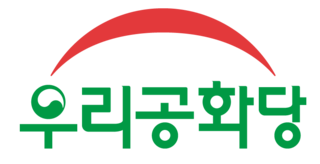
The Our Republican Party, formerly the Korean Patriots' Party (대한애국당), was a far-right political party in South Korea known primarily for its pro-Park Geun-hye stance. It was formed following a split within the New Saenuri Party. The party strongly supported former president Park Geun-hye.

The 2019 South Korean by-elections was held in South Korea on 3 April 2019. 2 seats to the National Assembly of South Korea were contested.
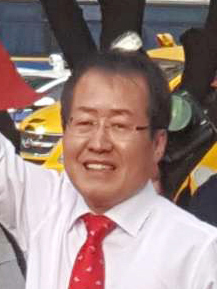
The Liberty Korea Party held a leadership election on 3 July 2017. It was the first election since the Liberty Korea Party became an opposition party.

Ha Tae-keung is a South Korean activist and politician who is currently a member of National Assembly representing the 1st constituency of Haeundae District, Busan. He has served as Vice President of the Bareun Party, a Vice President of the Bareunmirae Party, and one of the co-Presidents of the New Conservative Party.
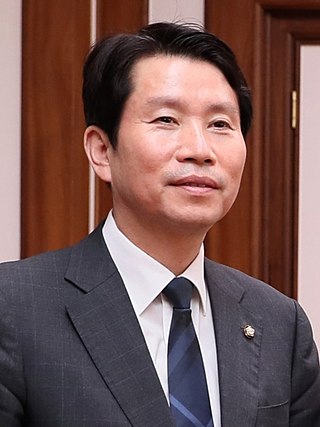
Lee In-young is a South Korean activist and politician who served as the Minister of Unification from 2020 to 9 May 2022. Prior to this, he was the parliamentary leader of the Democratic Party from 2019 to 2020. He has been the Member of the National Assembly for Guro 1st constituency from 2004 to 2008 and since 2012. Before entering to politics, he was the 1st President of the Association of National University Student Representatives, an anti-establishment student organisation.

The People Power Party, formerly known as the United Future Party, is a conservative and right-wing political party in South Korea. It controls the South Korean presidency and is the second-largest party in the National Assembly. The PPP, along with its historic rival, the Democratic Party, make up the two largest political parties in South Korea.

Park Wan-su is a South Korean politician serving as the Member of the National Assembly for Changwon Uichang since 2016. He was also the Secretary-General of the United Future Party (UFP) in 2020.
The Liberty Unification Party was a conservative political party in South Korea.
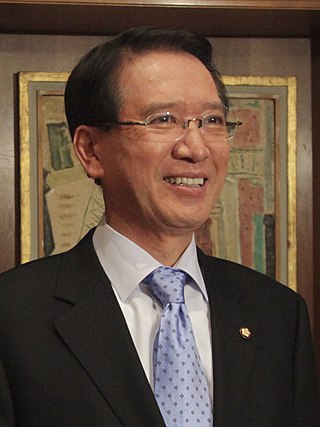
Kim Hyong-o is a South Korean writer and politician. He was a long-term Member of the National Assembly for Yeongdo from 1992 to 2012. During the parliamentary career, he served as the Speaker of the National Assembly from 2008 to 2010.
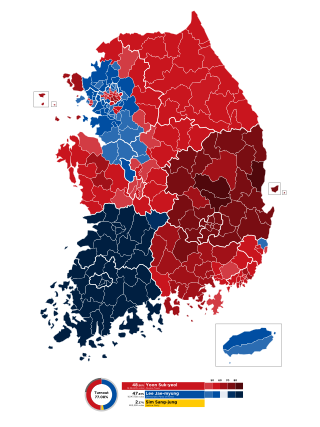
Presidential elections were held in South Korea on 9 March 2022. Under the South Korean constitution, presidents are restricted to a single five-year term, meaning that incumbent president Moon Jae-in was ineligible to run for a second term. Opposition candidate Yoon Suk Yeol of the People Power Party won the election, defeating candidate Lee Jae-myung of the incumbent Democratic Party.
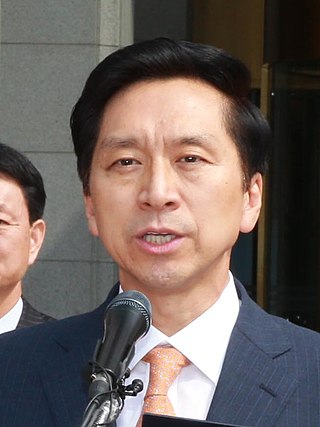
Kim Gi-hyeon is a South Korean lawyer and politician who served as the Mayor of Ulsan from 2014 to 2018. He was the acting President of the conservative People Power Party (PPP) from 30 April to 11 June 2021.
Kim Seon-dong is a South Korean politician who served as the Secretary-General of the United Future Party from 28 May 2020 until his resignation on 14 October 2020. Prior to this, he was the Member of the National Assembly for Dobong 2nd constituency.

The 2021 South Korean by-elections were held in South Korea on 7 April 2021. The National Election Commission announced on 2 March 2021, that the by-elections would be held for 21 public offices or electoral districts, including 2 Metropolitan mayors, 2 Municipal mayors, 8 Metropolitan Council constituencies, and 9 Municipal Council constituencies. Candidate registration ran from 18 to 19 March, and the list of candidates was confirmed on 26 March.

The 2019 South Korean National Assembly attack occurred on 16 December 2019, when supporters of the Liberty Korea Party, Our Republican Party, and Taegeukgi units attempted to enter the National Assembly Proceeding Hall.


















